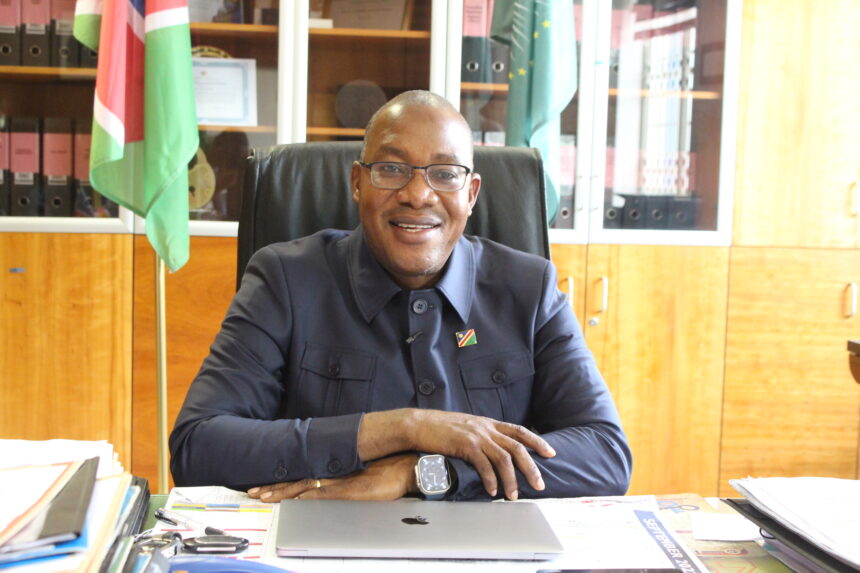The Ministry of Health and Social Services (MoHSS) in Namibia is tasked with providing quality public healthcare services to the Namibian population. Over 80% of Namibians rely on public healthcare services offered through an extensive network of facilities that offer a broad range of services, from primary healthcare to specialised and tertiary care.
Principles underpinning the provision of public health services focus on affordability to prevent financial hardship, maintaining high-quality, safe, and effective care, responsiveness to individual and community needs, efficient use of resources, resilience to withstand and respond to crises, and ensuring continuous access to essential health services.
Achievements
The Namibian government, through MoHSS, has been actively expanding and improving access to these services through various programmes and projects. These efforts include constructing new health facilities, procuring medical equipment and pharmaceuticals, and purchasing ambulances. The achievements of these initiatives have garnered regional and international recognition. For instance, Namibia received an award from PEPFAR in March 2023 for progress towards the UNAIDS fasttrack 95-95-95 targets and efforts to end AIDS as a public health threat by 2030. In February 2024, the country was recognised by the World Health Organisation (WHO) for achieving Silver Tier status on the Path to Elimination of Mother-to-Child Transmission of Hepatitis B Virus, and Bronze Tier status for HIV.
Namibia is the first country to meet the criteria for the Path to Elimination (PTE) of the Hepatitis B Virus, a milestone that highlights the country’s significant progress in public health interventions. These achievements are particularly beneficial for improving maternal and child health, leading to broader positive impacts for the nation.
The ministry has undertaken significant efforts to modernise and expand health facilities, improving access to essential services such as maternal and neonatal health, communicable and non-communicable disease treatment, specialised services and rehabilitative services. Major projects in 2023/2024 include the construction and renovation of intensive care units (ICUs), increasing the total number of ICU beds from 35 to 97, with further investments planned for regional hospitals.
Renal dialysis units are being expanded to meet demand, reducing reliance on private providers. Renovations and new installations are underway in several hospitals to increase the number of dialysis machines available. The Ministry has also upgraded medical oxygen systems at multiple hospitals and completed various other infrastructure projects, including minor renovations and pharmacy storage work at Walvis Bay Hospital, and civil works at Outapi District Hospital. In addition, renovations were undertaken at Nankundu Hospital Pharmacy, Mangetti Dunes Health Centre, Gam Clinic and Otjiwarongo Hospital Theatre’s ventilation systems.
The ministry has managed various disease outbreaks through robust surveillance and timely response measures, developed a National Action Plan for Health Security, and is planning the establishment of a National Public Health Institute. Digital health transformation is underway with the National eHealth Strategy.
Developmental social welfare initiatives address issues such as substance abuse and mental health, with facilities like the Eteganieno Rehabilitation and Resource Centre offering support and treatment. The National Drug Control Master Plan and Positive Parenting Handbook reflect a commitment to comprehensive societal health and human rights.
Challenges
Central Medical Stores (CMS) faces challenges in the procurement and distribution of pharmaceuticals and clinical supplies. MoHSS has developed a CMS Turnaround Strategy Phase 2 to improve storage infrastructure and operational efficiency. A new warehousing site is being considered to meet future needs.
Despite efforts to expand healthcare access through new health facilities and the Universal Health Coverage Policy, significant challenges persist in reaching remote and underserved areas. The effectiveness of these measures is hampered by infrastructure limitations and logistical complexities. The healthcare workforce faces shortages, especially in specialised fields. The National Human Resources for Health (HRH) Strategic Plan aims to address this through expanded training and recruitment, yet issues such as inadequate ICT infrastructure and high vacancy rates impede progress.
The health system’s ability to respond to disease outbreaks and emergencies is under strain. Although Namibia has robust surveillance systems, the ongoing threat of diseases like Covid-19 and malaria requires continuous strengthening of response capabilities and health security measures. With a significant portion of the health budget allocated to operational expenses, there is limited funding for infrastructure development and enhancements. This financial constraint challenges the ministry’s ability to implement large-scale improvements and maintain existing facilities effectively.
Future plans
Namibia has adopted the primary healthcare model, aiming to provide preventive health services and reduce referrals to higher-level facilities. The planned Windhoek District Hospital will alleviate pressure on Katutura Intermediate Hospital, which will serve as a training centre.
The National Human Resources for Health (HRH) Strategic Plan 2020-2030 aims to create a well-distributed and efficient health workforce by 2030. The ministry will continue supporting medical officers to specialise in various fields and is working to balance skills and meet public sector needs. An integrated Human Resources Information System (iHRiS) has been partially rolled out to manage the health workforce, though ICT equipment and network issues remain challenges. The ministry will fully roll out the iHRiS once the necessary ICT equipment is procured.
The government, through the MoHSS, is developing the Universal Health Coverage (UHC) Policy Framework that aims to strengthen access to essential health services, improve the quality of services, and reduce inequities experienced when accessing health services without financial hardship. The policy recognises the progress made in ensuring access to quality and affordable health services for all Namibians, while identifying gaps, risks and challenges to accelerate this progress. A health financing strategy will be developed to ensure the sustainability of the UHC Policy Framework.
In conclusion, Namibia remains committed to allocating 15% of its national budget to the health sector, in line with the Abuja Declaration. The ministry remains resolute in upholding principles that assert that health is a human right as guaranteed by the Constitution, ensuring non-discrimination in access to care.
We emphasise the availability of essential health services, accessibility without financial or social constraints, and equity, prioritising those most in
need.



